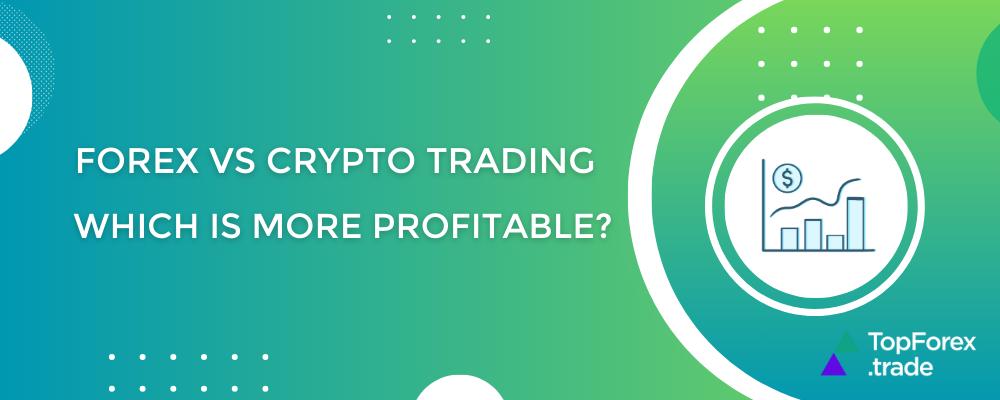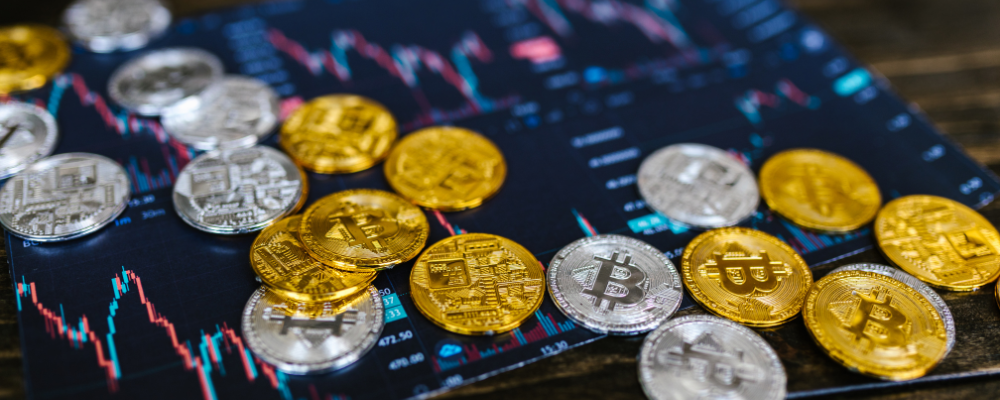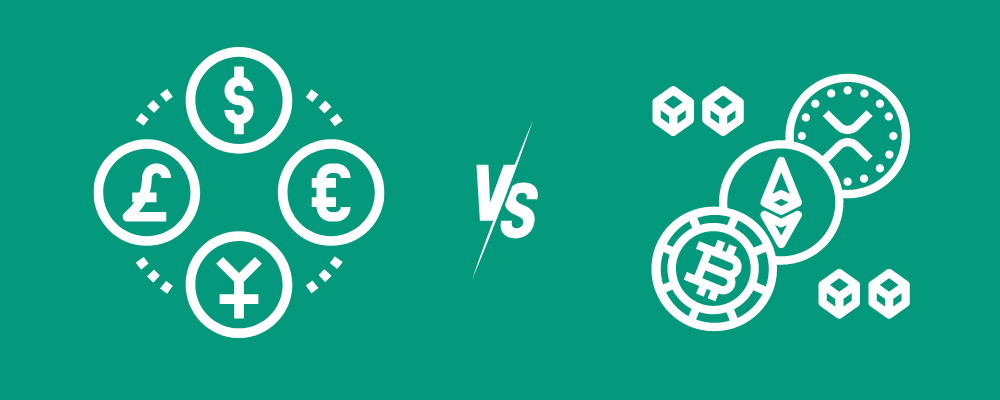Forex vs. Cryptocurrency trading: which offers higher returns?

Forex and Cryptocurrency trading are two of the hottest topics in the financial world, each offering unique ways to make money. Forex trading has been around for decades, dealing with the exchange of global currencies, while Cryptocurrency trading is a newer, fast-paced market known for its dramatic price swings. But which one is more profitable? In this article, we’ll break down the key differences between Forex and Crypto trading, looking at factors like volatility, market conditions, and potential returns to help you decide which path might be right for you.
Forex vs. Cryptocurrency trading: finding the most profitable trading market

Choosing between Forex and Cryptocurrency trading can feel like a tough decision for any trader. Both offer unique profit opportunities, but each comes with its own set of risks and challenges. Let’s dive deeper into the potential profitability of each market, with real-world examples and a comprehensive look at various trading instruments, including derivatives, futures, and different pairs.
- Check more about passive income with Crypto.
Forex trading: stability with predictable patterns
Forex trading involves buying and selling global currencies, such as the EUR/USD (Euro/US Dollar) or GBP/JPY (British Pound/Japanese Yen). The Forex market is the largest and most liquid market in the world, with a daily trading volume exceeding $6 trillion. This liquidity generally results in smaller price movements, making the market more stable compared to Cryptocurrencies.
Example: If you trade the EUR/USD pair and the price moves from 1.1000 to 1.1050, that’s a 50-pip move. Using leverage, a 1% change in the currency pair could result in a 50% gain on your invested capital. For instance, if you use 1:50 leverage, a 1% increase in the EUR/USD pair could result in a 50% return on your investment. Conversely, the same leverage could also lead to substantial losses if the market moves against you.
Forex derivatives:
- CFDs (Contracts for Difference): CFDs allow traders to speculate on price movements of currency pairs without owning the underlying asset. For example, if you predict that the GBP/USD will rise, you can buy a CFD to profit from that increase. CFDs offer high leverage, amplifying both potential gains and losses. A trader using a 1:100 leverage on a CFD could see significant profits or losses depending on the market movement.
- Futures: Forex futures are standardized contracts to buy or sell a currency pair at a predetermined price on a set date. For example, if you buy a EUR/USD futures contract anticipating that the Euro will strengthen against the Dollar, you can lock in a price now and benefit if the Euro rises. Futures require a higher initial investment but offer a way to manage risk with greater transparency and regulatory oversight compared to CFDs.
- Options: Forex options provide the right, but not the obligation, to buy or sell a currency pair at a predetermined price before a specific date. Options can be used to hedge or speculate on currency movements. For instance, if you anticipate the GBP/USD will fall, you could buy a put option to profit from that decline.
- Swaps: Forex swaps involve exchanging one currency for another and then reversing the exchange at a later date. They are used to manage interest rate differentials between currencies. For example, if you hold a long position in a currency with a higher interest rate and a short position in a currency with a lower interest rate, you could benefit from the interest rate differential.
Pro tip: Check out how to trade with leverage and margin.
Crypto trading: high risk, high reward
Cryptocurrency trading involves digital assets like Bitcoin (BTC), Ethereum (ETH), or lesser-known altcoins. The Crypto market is known for its extreme volatility; prices can fluctuate wildly within short periods due to news, regulatory changes, or social media trends.
Example: In early 2021, Bitcoin’s price surged from around $30,000 to $60,000 within a few months, then fell back to $30,000. A trader who bought Bitcoin at $30,000 and sold it at $60,000 would have realized a 100% profit. Conversely, if they bought at $60,000 and the price fell, they could have faced significant losses.
Cryptocurrency derivatives:
- Crypto futures: These are contracts to buy or sell a Cryptocurrency at a future date for a predetermined price. For instance, if you believe Bitcoin’s price will decline, you can sell Bitcoin futures to profit from that drop. Perpetual futures, a type of Crypto future, have no expiration date, allowing continuous trading. Due to the high volatility of Cryptocurrencies, futures can offer substantial profits but also involve significant risk.
- Crypto options: Options on Cryptocurrencies provide the right to buy or sell an asset at a set price before a certain date. For example, if you buy a call option on Ethereum, you profit if ETH’s price exceeds the strike price. Options offer flexible strategies for both hedging and speculation, allowing traders to potentially gain from significant price movements.
- Margin trading: This involves borrowing funds to increase your position size in Cryptocurrency markets. For example, if you use 10x leverage, you could potentially amplify your gains or losses by ten times. Margin trading can lead to high returns but also increases the risk of significant losses if the market moves against your position.
- Synthetic assets: These are financial instruments that mimic the performance of underlying Cryptocurrencies without directly owning them. They can be traded on DeFi (decentralized finance) platforms, providing exposure to Crypto markets with varying degrees of leverage and risk.
- Tokenized derivatives: Tokenized derivatives are blockchain-based representations of traditional financial instruments, including Crypto futures and options. These can be traded on decentralized exchanges, offering another way to gain exposure to Cryptocurrency markets.
Comparing the profitability of Forex and Crypto trading

Forex vs. Crypto trading:
- Forex: Provides stable returns with lower volatility, enhanced by leverage but generally offers lower profit potential compared to Cryptocurrencies. Risk management is more straightforward due to predictable price movements and tools like stop-loss orders.
- Cryptocurrency: Offers the potential for very high returns due to extreme volatility and large price swings. However, this also means higher risk, requiring more sophisticated risk management strategies and constant market monitoring.
Forex derivatives vs. Crypto derivatives:
- Forex derivatives: CFDs and futures offer high potential profits due to leverage, allowing traders to capitalize on relatively small price movements. However, the potential for loss is significant, especially with high leverage. Options and swaps provide additional tools for risk management and speculation.
- Crypto derivatives: Derivatives like futures, options, and margin trading in the Cryptocurrency market offer the potential for very high returns due to extreme volatility. However, this volatility also means that losses can be substantial. Crypto options and futures provide flexible strategies, but the high risk requires careful management.
Whether Forex or Cryptocurrency trading is more profitable depends on your individual preferences and risk tolerance. Forex trading generally offers a more stable environment with moderate returns, while Cryptocurrencies provide high-risk, high-reward opportunities. Derivatives, including CFDs, futures, options, and margin trading, can enhance profit potential but also add complexity and risk. The best choice for you will depend on your trading goals, market conditions, and how comfortable you are with market fluctuations.
The best brokers to trade Forex and Crypto
Now that you have a better idea of whether Forex or Cryptocurrency trading might suit you, finding a reliable Forex broker is the next step. The right broker can make a big difference in your trading experience, offering competitive fees, user-friendly platforms, and solid customer support. To help you get started, we’ve put together a list of the best FX brokers, highlighting the ones that stand out for their services, reputation, and overall value.
XTB FX and Crypto trading
XTB stands out with its extensive global reach, operating in over 190 countries while emphasizing security and transparency. Regulated by prominent authorities such as the FCA, CySEC, and KNF, it provides a reliable and well-regulated trading environment. Traders can access versatile platforms like xStation and MetaTrader 4, both featuring advanced tools for trading a wide range of assets. XTB also offers flexible account options, including Standard and swap-free accounts, to accommodate different trading styles. The broker further enriches the trading experience with resources such as daily market updates, economic calendars, and educational webinars. Additionally, XTB allows traders to trade CFDs on cryptocurrencies like Bitcoin, Ethereum, and Tether, offering the ability to go long or short with 1:2 leverage on numerous crypto CFDs.
BlackBull FX and Crypto trading
BlackBull Markets offers a wide range of trading options, from commodities and currencies to stocks, futures, indices, and cryptocurrencies. Regulated in Seychelles, it provides a secure trading environment that caters to all types of traders. Whether you’re looking for a Standard, Prime, Institutional, Islamic (swap-free), or demo account, there’s something to fit your needs. You can trade using your favorite platforms like MT4, MT5, cTrader, Web Trader, TradingView, or even on mobile apps. Tools like BlackBull CopyTrader and BlackBull Shares take your trading experience to the next level. Plus, you’ll find plenty of educational resources, such as webinars and tutorials, to help sharpen your skills. Get up to 1:100 leverage, fast execution, and tight spreads on 11 major cryptocurrencies at BlackBull Markets.
eToro FX and Crypto trading
eToro, founded in 2007, has made FX and Crypto trading easy and engaging for traders around the world. Known as a pioneer of Crypto trading, eToro offers a user-friendly platform with unique features like Social trading, where you can follow and Copy the trades of experienced investors. With zero commissions and strong regulatory oversight, eToro is a reliable choice for trading.
On eToro, you can connect with other traders, replicate their strategies, and trade FX and crypto without extra fees. The platform is simple and includes advanced charting tools to help you make smart decisions. It also offers CopyPortfolios, which allow you to invest in professionally managed portfolios.
To get started on eToro, just sign up, verify your identity, and deposit funds using a variety of methods. Then, search for the assets you want to trade, set your trade parameters, and start executing your trades.
Risk disclaimer: eToro is a multi-asset platform which offers both investing in stocks and cryptoassets, as well as trading CFDs.
CFDs are complex instruments and come with a high risk of losing money rapidly due to leverage. 61% of retail investor accounts lose money when trading CFDs with this provider. You should consider whether you understand how CFDs work, and whether you can afford to take the high risk of losing your money.
This communication is intended for information and educational purposes only and should not be considered investment advice or investment recommendation. Past performance is not an indication of future results.
Copy Trading does not amount to investment advice. The value of your investments may go up or down. Your capital is at risk.
Don’t invest unless you’re prepared to lose all the money you invest. This is a high-risk investment and you should not expect to be protected if something goes wrong. Take 2 mins to learn more.
eToro USA LLC does not offer CFDs and makes no representation and assumes no liability as to the accuracy or completeness of the content of this publication, which has been prepared by our partner utilizing publicly available non-entity specific information about eToro.
AvaTrade FX and Crypto trading
AvaTrade, founded in 2006, is a trusted Forex broker with over 300,000 clients worldwide and is regulated by authorities like the Central Bank of Ireland and ASIC.
For FX and Crypto trading, AvaTrade offers competitive spreads, flexible leverage, and various account types to suit different traders. It supports popular platforms like MT4 and MT5, which come with advanced charting tools and fast execution speeds. You also get risk management tools like stop-loss and take-profit orders, plus educational resources like webinars and market analysis.
AvaTrade – your trusted Cryptocurrency broker.
OANDA FX and Crypto trading
OANDA, founded in 1996, is a trusted online broker known for its reliability and excellent customer service. It offers a secure environment for trading with competitive spreads and flexible leverage, letting you tailor your trades to fit your strategy and risk tolerance.
You can trade on popular platforms like MetaTrader 4 or OANDA’s own platform, OANDA Trade, which includes advanced charting tools and features for technical analysis and automated trading. OANDA also provides valuable tools like daily and weekly market analysis, forex news, and expert insights to enhance your trading experience.
OANDA also offers CFD trading on Cryptocurrencies, including Bitcoin, Bitcoin Cash, Ether, and Litecoin.
Related articles:
Forex vs. Crypto trading - FAQs